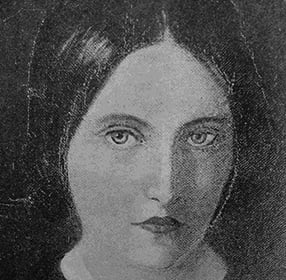[A rose has thorns as well as honey,]
A rose has thorns as well as honey,
I’ll not have her for love or money;
An iris grows so straight and fine,
That she shall be no friend of mine;
Snowdrops like the snow would chill me;
Nightshade would caress and kill me;
Crocus like a spear would fright me;
Dragon’s-mouth might bark or bite me;
Convolvulus but blooms to die;
A wind-flower suggests a sigh;
Love-lies-bleeding makes me sad;
And poppy-juice would drive me mad:—
But give me holly, bold and jolly,
Honest, prickly, shining holly;
Pluck me holly leaf and berry
For the day when I make merry.
This poem is in the public domain. Published in Poem-a-Day on December 23, 2023, by the Academy of American Poets.
“[A rose has thorns as well as honey]” appears in Christina Rossetti’s Sing-Song: A Nursery Rhyme Book (George Routledge, 1872). In “Sound, Sense, and Structure in Christina Rossetti’s Sing-Song,” published in Children’s Literature, vol. 22 (1994), Sharon Smulders, a former professor in the department of English, languages, and cultures at Mount Royal University, writes, “Uninterested in budding or blossoming womanhood at this point in the volume, Rossetti now refrains from giving priority to the rose’s beauty. Later still, the feminine rose is wholly repudiated: ‘A rose has thorns as well as honey, / I’ll not have her for love or money.’ Recalling ‘Wee Wee Husband’ and ‘What Does the Bee Do?,’ the end-rhymes ‘honey’ and ‘money’ infect the rose with the taint of sexual and commercial exchange. The speaker instead responds to the needs of the approaching winter, choosing ‘holly, bold and jolly, / Honest, prickly, shining holly.’”

